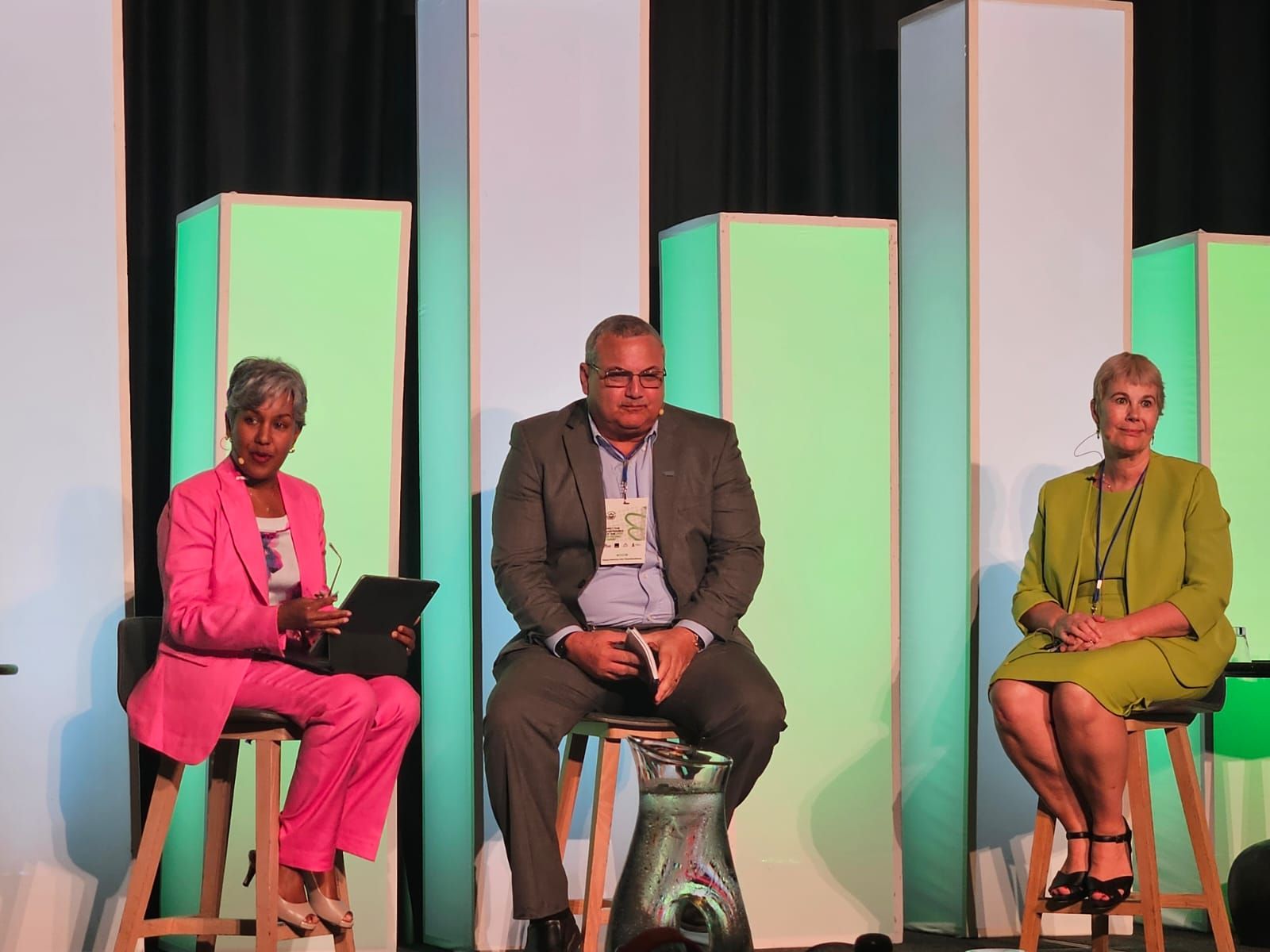
L-R: Marla Dukharan, Franz Manderson, Sue Winspear (photo credit: Charissa Mooteeram)
|
Getting your Trinity Audio player ready...
|
By Alric Lindsay
On a panel moderated by economist Marla Dukharan at the Chamber of Commerce Economic Forum today, January 17, 2025, Deputy Governor Franz Manderson and outgoing Auditor General Sue Winspear shared views on accountability and governance in the Government. They also discussed how a scorecard, which could be managed and implemented by an independent body, could be used to measure the Government’s performance or outcomes in certain areas.
What is an accountability scorecard?
Regarding the scorecard, Dukharan referred to “the government’s accountability scorecard that the Chamber announced that they will introduce some months ago.”
Concerning this, a story in the Cayman Compass dated September 9, 2024, explained:
In an effort to keep government accountable, the Chamber of Commerce says it intends to create a scorecard to monitor if future administrations deliver on their announced priorities.
The ‘government accountability scorecard’, known as GAS, will be implemented following the next election, which is expected to be held in April 2025, according to Chamber President Joanne Lawson.
The Cayman Compass added:
The scorecard, she said, is a mechanism for holding government accountable to its strategic priorities and for promoting transparency, effectiveness and accountability in governance.
Lawson said the scorecard will be a tool through which key government initiatives, set out in strategic policy statements, can be monitored. Strategic policy statements outline a government’s key financial forecasts and policy objectives.
What accountability looks like in the current Government
Before discussing specific accountability scorecard models, Dukharan asked the Auditor General why accountability is important and how the Auditor General’s office drives accountability in the Cayman Islands.
Winspear explained:
Well, me as the Auditor General of my office and the Ombudsman, that’s Sharon Roulstone and her office, are completely independent of Government and are really key pillars of the accountability framework. So, we sometimes get called watchdogs and things like that.
But in being auditor of Government, we are about driving improvement.
I can’t look at policy, but I can look at the implementation of policy and holding Government to account. And how I do this is by doing the financial audit of the 47 entities that comprise the public service.
She added:
The other thing we do as well as doing the financial audit is performance audit, and as the name suggests, it’s a sort of unique public sector audit skill, but it is looking at the economy, efficiency and effectiveness and the value the public gets from public services.
She continued:
… the key bit of the accountability comes from the Public Accounts Committee of Parliament where they hold hearings and invite witnesses in and question. So, that along with the media and us trying to promote our work, I think does hold the government accountable. Inevitably my job’s about improvement. So the focus tends to be on the things that haven’t happened and what happens next and the recommendations I make.

Attendees at the Chamber of Commerce Economic Forum
Sharing his view on accountability, the Deputy Governor said that his job “is to make things happen” and “to make sure that the civil service performs.”
However, the Deputy Governor was mindful that “each year politicians get up and make promises to their citizens” about what they will do when elected. Concerning this, he noted that his “job is to make sure that they can deliver on those promises.”
He elucidated:
Once they give us very, very clear direction as to what they want to achieve, then we as our choice job to deliver those policies and projects that they have promised to the people of the Cayman Islands.
So accountability is absolutely critical.
To demonstrate this commitment to accountability is more than talk, the Deputy Governor shared that a new strategic plan has been launched to focus on accountability.
Notwithstanding this commitment, the Deputy Governor shared that the civil service “gets a lot of criticism, some deserved, some not.”
An example of one of the criticisms shared by the Deputy Governor is that “There’s no accountability in the civil service, nobody gets fired [and] everybody’s having a good time.”
The Deputy Governor defended the civil service, saying, “I’m here to tell you that that’s not true,” adding, “Accountability across the civil service has improved dramatically over the last few years.”
Providing evidence of this, the Deputy Governor explained:
We have made sure that our leaders are upskilled so that they are having the leadership capabilities… that they are holding their staff to account, that they are having the courageous conversations and that they have the systems in place that when they do want to make hard decisions, it supports them.
… we have reformed our performance management systems. Everyone has a performance agreement that they are held to account in January, in December, January.
These performance management systems include a performance appraisal and score given to each civil servant after their assessment. Five is the highest, and three or less is below the expected standard. Anyone who is not performing to the expected standard is placed on a performance improvement plan to give them an opportunity to improve.
The Deputy Governor joked that, however, if they do improve, they may take their skills to explore better pastures in the private sector. That is to say, the Government risks losing good staff when they become highly trained and skilled within the civil service.
Notwithstanding the risk of staff leaving the civil service after benefiting from training, the Deputy Governor said, “Accountability is alive and well in service, and it’s getting better every day.”
Accountability scorecard models
Having discussed the roles of the Deputy Governor and the Auditor General in achieving accountability in the Government, the conversation turned to the idea of an independent body assessing the entire Government through periodic scorecards.
Regarding this, Dukharan mentioned the Economic Programme Oversight Committee in Jamaica.
Based on the EPOC website, it “was established in 2013 to monitor the implementation of Jamaica’s economic reform measures under its agreement with the International Monetary Fund (IMF).”
The website added:
The committee comprises 11 persons from the private and public sectors, and civil society. They receive and assess information from the Government of Jamaica (GOJ) to track the progress of the targets under the three-year Precautionary Stand-By Arrangement (PSBA) which was signed in 2016.
EPOC will monitor the fiscal, monetary and financial sector indicators which are under the standby agreement as the GOJ aims to preserve macroeconomic stability achieved under the previous agreement, with renewed focus on growth and job creation, while maintaining fiscal responsibility.
Dukharan explained that “the private sector, civil society, the opposition, even members of government, came together to form this committee that basically held the [Jamaican] government to account for doing the things that the government had agreed to do, which they had never done before, they had agreed to in the past, and they never did it.”
Dukharan added:
But you needed this body basically to hold a stick over them, in a sense. And so this Economic Programme Oversight Committee was born. And for the past 10 years or so, 10, 11 years, every quarter they received data from the government in terms of what was achieved, what wasn’t achieved, what is the inflation rate, unemployment rate, growth rate, fiscal deficit, level of reserves, et cetera, et cetera. And then they come to the public.”
Dukharan continued:
They come to the public on a quarterly basis, literally. The chairman of the EPOC… explains to the Jamaican people in layman’s terms, this is what the government said it was going to, this is what it did in fact, achieve, this is why it didn’t achieve everything, this is how we’re going to wheel and come again, and this is what we’re going to do for the next quarter.
Dukharan concluded:
So, this has been a huge tool of accountability in Jamaica, which I credit as being fundamental to the improvement that we’ve seen in the past 12 years or so in Jamaica. And this… was the inspiration for the Government Accountability Scorecard that the Chamber announced some time ago, which by the way, is very much in a conceptual phase.
Implementation of the accountability scorecard in Cayman
Discussing the implementation of an accountability scorecard, the Deputy Governor noted that he had a conversation about this with the Chamber of Commerce a few months ago. However, there was a view that it could be implemented following the next election rather than in the middle of the current Government term.
The Deputy Governor explained further:
So, as you know, after an election, a new government is formed. They set up their strategic policy statement. They settle all the outcomes that they want to achieve for the persons. So in the civil service, once we get those very clear marching orders, then it’s our job to deliver anything that shines the light on government’s performance.
The Deputy Governor’s statement here not only summarizes his approach toward the implementation of an accountability scorecard but also puts political candidates for the April 2025 election on notice that they will be held to higher standards once elected.
Note to readers
Based on Dukharan’s explanation, the Economic Programme Oversight Committee in Jamaica is “governed by an MoU between the EPOC and the government.”
For more information on the Economic Programme Oversight Committee in Jamaica, please see the below link:

